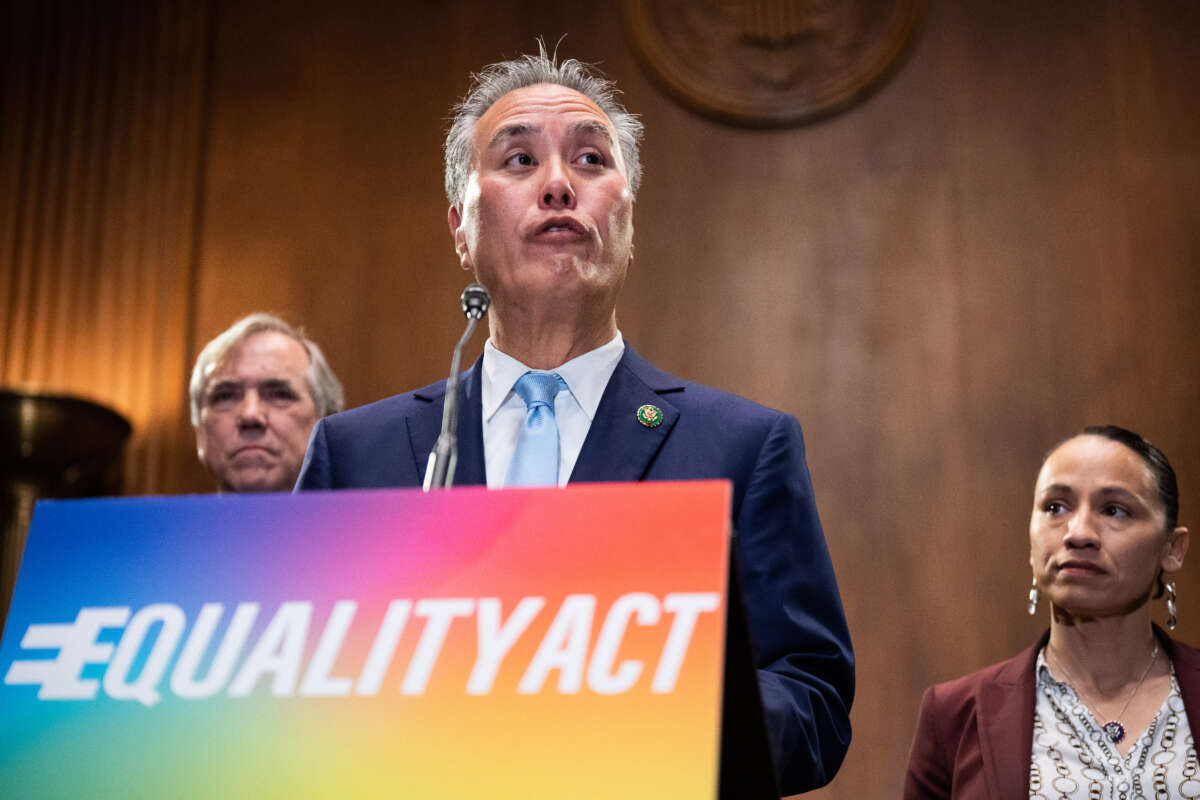Did you know that Truthout is a nonprofit and independently funded by readers like you? If you value what we do, please support our work with a donation.
Democrats introduced a bill on Wednesday that would, for the first time, enshrine protections for LGBTQ people in a wide swath of situations and codify safeguards granted to the LGBTQ community under a landmark Supreme Court ruling.
Rep. Mark Takano (D-California) — co-chair of the Congressional Equality Caucus and first openly gay person of color elected to Congress — and Sen. Jeff Merkley (D-Oregon) reintroduced the Equality Act in both chambers of Congress, saying that it is long overdue for Congress to take action to protect LGBTQ people, especially in the face of a wave of attacks by the right.
The bill would amend the 1964 Civil Rights Act to include LGBTQ people in protecting against discrimination in areas regarding employment, housing, education, credit, and more. It would be the first federal law to explicitly prohibit discrimination against LGBTQ people on such a large scale, according to the bill’s fact sheet, providing “full personhood under the law,” Takano said at a press conference on Wednesday.
The bill has the support of the entire Democratic caucus in the House, according to Takano, as well as a significant number of Democrats in the Senate.
“We introduce the Equality Act today to tell kids across the country who might feel threatened or scared about who they are and how others react to them that you are not alone, and that you should have the opportunity to participate in every aspect of national life,” said Merkley.
LGBTQ rights are under attack. Across the country, right-wing lawmakers have introduced over 530 anti-LGBTQ bills just this year, hundreds of them aimed at eroding trans children and adults’ rights. Dozens of these bills have been passed into law.
Takano said at a press conference that the Equality Act could help beat back some of these attacks. “We cannot allow extremists in our country to once again normalize homophobia and attacks on LGBTQ people. We can’t turn away from the discrimination that still exists for so many LGBTQ people today,” he said.
The bill has passed the House twice under Democratic leaders, but faces long odds of passing under Republican rule. The Democrats pointed out, however, that the Defense of Marriage Act, aimed at enshrining protections for same-sex marriage, passed the Senate on a bipartisan basis last year and that the Equality Act could see the same support in the Senate this time around.
Currently, LGBTQ people are granted protections against discrimination under Bostock v. Clayton County, a 2020 Supreme Court decision ruling finding that discriminating against someone on the basis of their gender identity or sexuality is equivalent to discrimination on the basis of sex, which is prohibited in employment situations under Title VII, or the Civil Rights Act.
However, with the current far right Supreme Court justices who are willing to overturn landmark decisions on behalf of conservative activists, the protections under Bostock are far from permanent; indeed, right-wing groups have already been waging legal battles attempting to limit the range of protections that Bostock can provide. As a result, LGBTQ advocates have long said that enshrining the discrimination prohibition into federal law is crucial in order to ensure lasting protections for LGBTQ people.
A terrifying moment. We appeal for your support.
In the last weeks, we have witnessed an authoritarian assault on communities in Minnesota and across the nation.
The need for truthful, grassroots reporting is urgent at this cataclysmic historical moment. Yet, Trump-aligned billionaires and other allies have taken over many legacy media outlets — the culmination of a decades-long campaign to place control of the narrative into the hands of the political right.
We refuse to let Trump’s blatant propaganda machine go unchecked. Untethered to corporate ownership or advertisers, Truthout remains fearless in our reporting and our determination to use journalism as a tool for justice.
But we need your help just to fund our basic expenses. Over 80 percent of Truthout’s funding comes from small individual donations from our community of readers, and over a third of our total budget is supported by recurring monthly donors.
Truthout has launched a fundraiser to add 500 new monthly donors in the next 9 days. Whether you can make a small monthly donation or a larger one-time gift, Truthout only works with your support.
